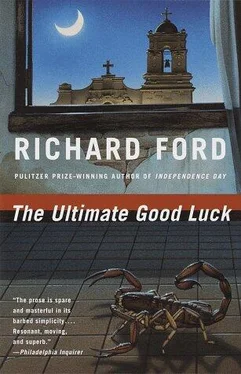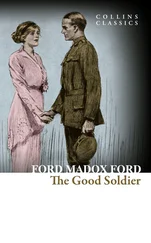“Maybe later,” Quinn said. He stared at the undifferentiated wall of trees. “What’s happened with Deats?” he said.
“Nothing,” Bernhardt said.
“But it’s getting done right?”
“Yes. But it is best to be very cautious now,” Bernhardt said. “Mr. Deats is not a mystery. But he is a problem to be solved. And we must take pains.”
Bernhardt stopped the Mercedes in the dark in front of what looked like an implement shed Quinn wouldn’t have noticed in the trees, though the shed was built partway into the road so that you could hit it without looking for it, and past it the road quickly dwindled into a pony path and disappeared. The air swarmed up sweet and heavy in the darkness, and there was no noise besides the car ticking. Inside the shed a green candle struggled to illuminate a plank bar that had been set up on oil cans and a glass basin in the dirt underneath it with a hose siphon leaking some kind of mescal.
Bernhardt walked around the shed and into the gallery of bamboo, taking a blind path that led immediately past a row of rattan shanties with sheet metal roofs, lower than his head and invisible from the road. They walked into a shallow ditch and up beside what smelled like a trough of smoking vegetable refuse that made Quinn’s eyes sting. Some of the shanties had papers on their fronts fanning a strike at the technological college, but no one was inside any of the doors, and the thought of a strike in the undergrowth seemed funny. The path through huts reminded him of two things at once, neither one funny and both dangerous: a ville on the coast below Phan Rang where there was a woman who had said something to him in French that he was willing to get killed to check out again. The other was of almost any place on any trail in-country that became a sudden killing zone, some dense place you took fire first at the waist, then the ankles, and had no place to return it, and lay shot-up, waiting until you got it stuck in your ear. Memory seemed like an account full of the wrong currency.
They walked until Bernhardt seemed to recognize one of the shanties and turned, his face pale and wide in the dark. He motioned with his hand and leaned through the mosquito netting that covered the door.
The air inside was cool and smelled like battery acid. Quinn felt exhilarated, though he was blind and his eyes were dilating too slowly.
Bernhardt suddenly struck a match and held it up. Against the straw wall was a wood cot and the outline of something white laid out on it. Above the cot was a poster of Elvis Presley wearing his yellow satin suit and red, white, and blue guitar, and looking ornery. When Bernhardt moved near the cot Quinn could make out a man in a muslin communion suit rolled up to the calves and a red sash tied in folds around his waist. The man appeared to be sleeping, though there was a long purple scar on his head that had cut off the helix of his ear, and made it clear the man wasn’t sleeping.
Bernhardt knelt and put the match near the man’s face. “Dionisio,” he said loudly, as if he was trying to wake the man up. Bernhardt stared at the damaged face, which was candle-colored and had ulcers. “Hermano,” Bernhardt said. Quinn felt suddenly that someone had entered the room. He turned and stepped back quickly, but no one was there, and Bernhardt’s match died. He felt exhilarated again and unreachable, as though everything he had seen had been sucked out of existence. A second match hissed, and Bernhardt was looking at him, waiting for the light to make him able to speak.
“This is the man who sells your brother cocaine,” Bernhardt whispered. The match plumed up brightly between his fingers. Bernhardt looked at the man on the cot beside him. “Dionisio,” he whispered, and turned back toward the cot. He drew the match to the man’s cheek, held it close as though examining something infinitesimal on the surface of the skin, then extinguished it there.

Bernhardt drove them back toward town quickly. The night felt appealing. Quinn wanted to let it go. Off the valley floor he smelled sweet Cordillera sage as they reached the vapor light and the empty boulevard where the city took up.
“What was the kid’s name?” There was no reason to get worked up over a kid he wasn’t acquainted with. Dead boys didn’t bother him. But he didn’t know why he had to see it. It made him feel set up.
“Dionisio Angel Perez,” Bernhardt said casually.
“Who’d he run for?”
“Many,” Bernhardt said.
“Deats?”
“Yes.”
“So did Deats cut him?”
Bernhardt glanced at him sideways, then up and down the empty yellow boulevard as he crossed it toward the Centro. “The police catch him fucking with a woman in his car, you see. And they say he has to pay them money because it is illegal to fuck in the car when it is not for your wife.” Bernhardt took a deep breath. “So. He give them money and they go away. But in a little while they come back, very borracho, and they say to give them more money. And Dionisio pleads he has no more. So the police go and bring machetes, they take him out into the trees and cut him. Then they run away to the mountains and we never see them again. Maybe they are guerrillas now.” Bernhardt turned up the greasy cobbled street that ended in the lights of the Centro.
“Did you kill him?” Quinn said.
“No,” Bernhardt said solemnly and shook his head, attending the street. They passed more houses guarded by soldiers who gazed at the car hypnotically. “The police,” Bernhardt said. It was the story Bernhardt wanted to impress him with.
“Did I have him killed?” Quinn said.
“No.”
“Did Deats?”
“The police,” Bernhardt insisted and looked at him seriously. It was a warning.
The Mercedes pulled out into the Avenue Guerrero, which boundaried the zócalo. The Christmas lights were on in the trees, the kiosk was full of beige-uniformed musicians. The cafés were jammed, and the Portal was a carnival. He liked it that way at night, as if the day had condensed the best part of itself down to this. Rae was sitting where he’d left her, halfway down the Avenue Hidalgo side of the square, alone. Seeing her made him feel happy for a moment.
“Who else is involved?” Quinn said. He knew Bernhardt wouldn’t wait and he wanted to know something important. Bernhardt wove through the wide street, eyes intent on pedestrians.
“You are,” Bernhardt said casually. “But not in that way.”
“Why do I have to be?” He glanced quickly at the crowds in the square, then back at Bernhardt.
Bernhardt turned down the south side of the zócalo and angled to the curb. “My father is dead, now, two years,” he said distractedly, and paused a moment. “I have to leave my government career to come and support my mother and my brothers. I am like you in that way. I don’t want to. But I am involved.” He smiled, staring out through the windshield. “I leave my wife because it is too much in the country in Oaxaca to please her. She is a profesora.” Bernhardt was staring at nothing.
“I don’t know what the fuck you’re talking about,” Quinn said. “Does he get out now because the kid’s dead?”
“No,” Bernhardt said. He looked at Quinn now oddly.
“So why do I have to see that? Just for laughs?”
Bernhardt reached across and opened the door. “You will know what I am trying to do for you now,” he said. “You see what I have to see. You are involved.”
The street noise blared inside the car. The band was playing exuberantly. Quinn got out and shut the door, then looked in through the closed window.
“Don’t get me shot,” he said through the glass. “I wouldn’t like that.”
Читать дальше








![Theresa Cheung - The Dream Dictionary from A to Z [Revised edition] - The Ultimate A–Z to Interpret the Secrets of Your Dreams](/books/692092/theresa-cheung-the-dream-dictionary-from-a-to-z-r-thumb.webp)




